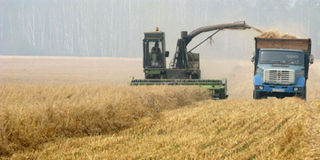Russia drought to turn fortunes of Kenyan wheat farmer

A self-propelled combine harvester on a field near a village of Meshcherskoye, Moscow on August 15, 2010. A drought and heatwave in Russia is sending ripples across the world and Kenya could just make something out of it.AFP PHOTO / YURI KADOBNOV
What you need to know:
Wheat prices expected to rise
“This, coupled with wheat stem rust in some parts of the world, will push our prices up internationally, though they will spill over to Kenya slowly.” Hugo Wood, Cereal Growers Association
“The price of bread is likely to go up in the coming weeks, due to the Russian situation, high import duty and hoarding of wheat by farmers.” Diamond Lalji, National Millers Association
A devastating drought in Russia, which is the world’s fourth largest exporter of wheat after the US, the European Union and Canada, could change the fortunes of the Kenyan wheat farmer for the better.
The worst drought in half a century, which also started wild fires and destroyed 20 per cent of its wheat, has made the Russian government ban exports.
Prime minister Vladimir Putin, said the ban that took effect on Sunday, was needed to prevent a rise in domestic food prices, feed Russia’s cattle and build up grain reserves.
Other countries in the region known as the Black Sea, including the Ukraine, have also been affected by drought with Pakistan also reporting destruction of half a million tonnes of its wheat by floods.
The outgoing Cereal Growers Association chairman, Hugo Wood, told the Nation in an interview that international wheat prices had risen by 80 per cent, but that its effects will be felt slowly in Kenya, with a bag of wheat expected to eventually cost as high as Sh3,000 and 3,500.
“This, coupled with wheat stem rust in some parts of the world, will push our prices up even though they will spill over to Kenya slowly,” he said.
There has been a tug of war between wheat farmers and the government over the proposed lowering of import duty, which farmers complained would lower wheat prices beyond profitability.
During his budget speech in June, Finance minister Uhuru Kenyatta, lowered import duty from 25 to 10 per cent. However, the changes have since not been implemented because of protests from farmers.
Farmers now see this calamity in far away Russia and Pakistan as a blessing in disguise, coming to rescue them. Mr Wood, however, allayed fears that the expected rise in wheat prices will necessarily raise the price of bread.
“It is not in the best interest of bakers to increase bread prices as consumers will move to ugali since maize prices are currently very low,” he said.
National Millers Association Chairman Diamond Lalji has warned that the price of bread is likely to go up in the coming weeks, due to the Russian situation, high import duty set by the Kenya government and hoarding of wheat by local farmers in anticipation of better prices.
National Cereal Growers Association chairman Timothy Busienei also said that in the past there has not been a relationship between the prices of wheat and those of bread.
He said last year a bag of wheat was selling as high as Sh3, 000 and this year it has come as low as Sh2, 300 but the price of bread had not come down.
“Bakers need to lower the prices. Farmers do not control prices,” he said and added that the Mr Lalji should not try and dictate to the other players in the field.




